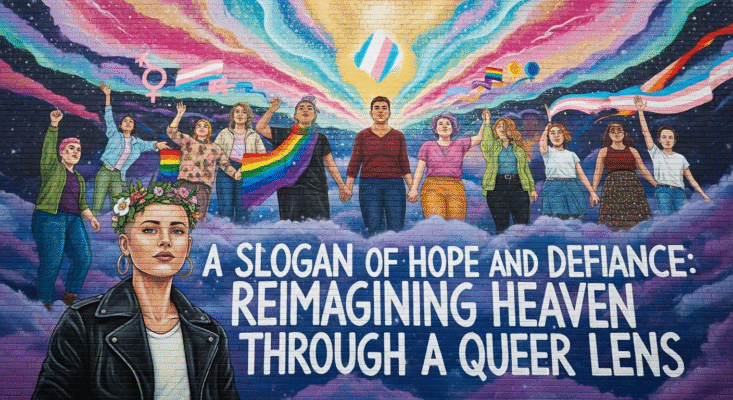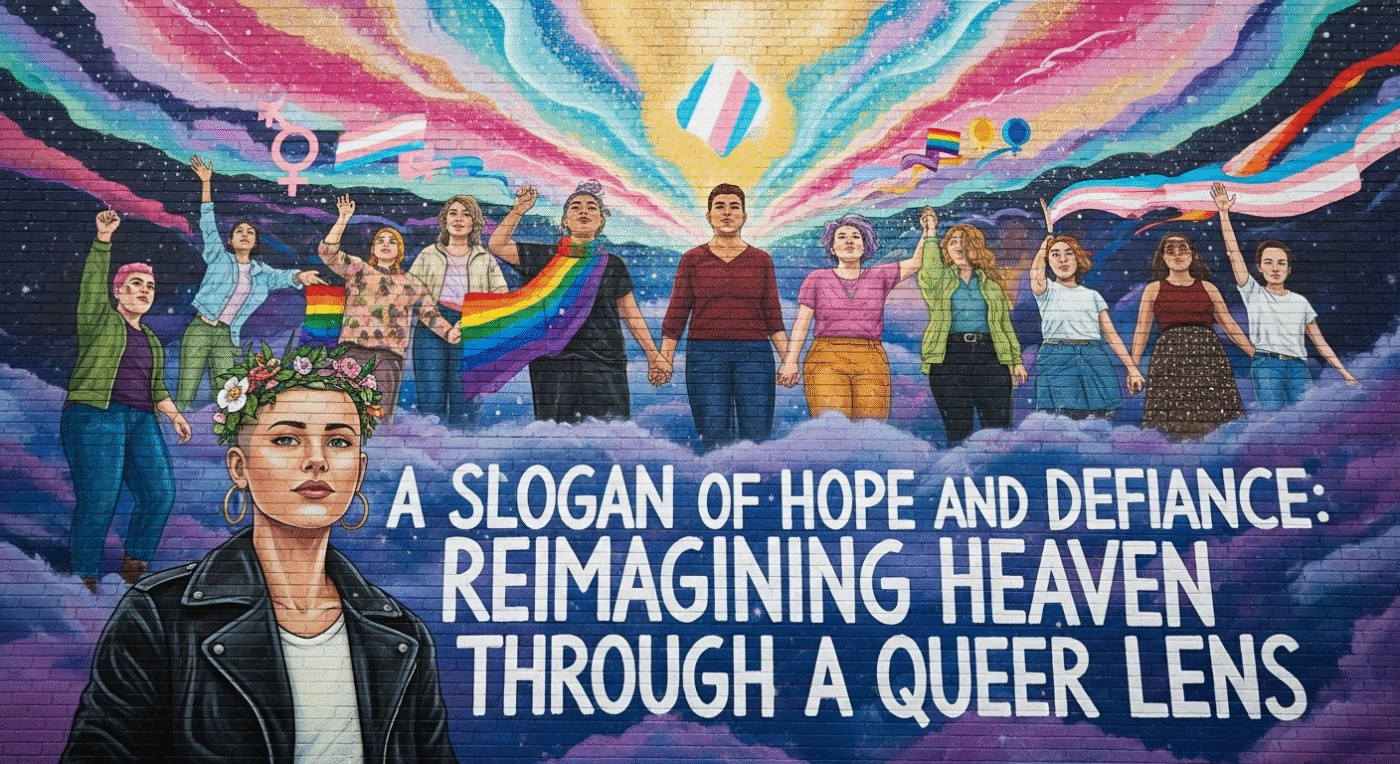Uncategorized
All Lesbians Go to Heaven: From a TV Eulogy to a Queer Theological Anthem
The phrase “all lesbians go to heaven” is more than just a catchy slogan emblazoned on t-shirts and bumper stickers.[1][2] It’s a defiant declaration, a comforting whisper, and a theological statement that has journeyed from a heartbreaking moment in television history to a powerful affirmation within the LGBTQ+ community. This phrase, born from grief and exclusion, has been reclaimed as a symbol of hope, challenging centuries of religious condemnation and offering a vision of a divine that is radically inclusive. This blog post will delve into the origins of this iconic phrase, its evolution into a community touchstone, and its profound implications for a queer understanding of the afterlife.
The Pop Culture Genesis: A Farewell to Dana Fairbanks
To understand the weight of “all lesbians go to heaven,” we must first travel back to 2006 and the third season of the groundbreaking Showtime series The L Word. The show, which followed the lives and loves of a group of lesbians in West Hollywood, was a cultural phenomenon for its then-unprecedented focus on queer women.[3] Among its beloved cast of characters was Dana Fairbanks, a professional tennis player whose journey from being closeted to living an out and proud life resonated deeply with many viewers.[3]

The third season took a tragic turn as Dana was diagnosed with an aggressive form of breast cancer. Her death in the episode “Losing The Light” remains one of the most devastating moments in the series’ run.[3] The subsequent episode, “Last Dance,” depicts her funeral, an event that becomes a painful reminder of the hostility queer people often face, even in mourning. Dana’s conservative parents, who struggled to accept her sexuality in life, control the service, seating her chosen family—her friends, her community—at the back of the church.[3]
It is in this atmosphere of grief and invalidation that the phrase is born. As Dana’s friends steal her ashes to hold their own, more authentic memorial, the sentiment emerges as a form of solace and rebellion. It’s a way of saying that despite the judgment of the world, and even the judgment of a narrow-minded version of religion, Dana’s life and love were good and worthy. The impact of this storyline was so profound that the show’s creator, Ilene Chaiken, has since expressed regret over the decision to kill off the character, acknowledging the deep pain it caused many viewers.[4][5]
A Slogan of Hope and Defiance
In the years since Dana’s on-screen death, “all lesbians go to heaven” has taken on a life of its own. It has transcended its fictional origins to become a widely recognized and cherished phrase within the lesbian community. It appears on everything from art prints and Etsy merchandise to TikTok videos and Reddit threads, a testament to its enduring appeal.[1][2][6][7][8][9][10]

The phrase’s power lies in its simplicity and its direct rebuttal to a long history of religious doctrine that has condemned LGBTQ+ people. For centuries, many Christian traditions have taught that homosexual acts are sinful, a belief that has been used to justify exclusion, discrimination, and violence.[11][12] The threat of damnation has been a heavy burden for many queer people of faith, forcing them to choose between their spirituality and their authentic selves.[13]
“All lesbians go to heaven” cuts through this painful history with a joyful and unwavering assertion of worthiness. It doesn’t engage in complex theological debates or seek permission from religious authorities. Instead, it claims a place in the divine, unconditionally. It’s a collective deep breath, a shared understanding that lesbian love is sacred and that a just and loving God would not deny a heaven to those who love fully and courageously.
Reimagining Heaven Through a Queer Lens
The phrase also serves as an accessible entry point into the rich and evolving field of queer theology. Queer theology challenges the rigid, heteronormative interpretations of religious texts and traditions that have been used to harm the LGBTQ+ community.[14][15][16] It seeks to unearth the stories and perspectives that have been buried and to construct a faith that is affirming and liberating for all people.


Central to queer theology is the idea of a God who transcends human-made binaries. If God created a world with the infinite variety of sunrises and sunsets, rather than just day and night, then why would human gender and sexuality be confined to a rigid binary?[14] This perspective sees God as inherently queer, constantly breaking down boundaries and defying easy categorization.[15][17]
Furthermore, queer theologians often emphasize that the core message of Jesus was one of radical love, justice, and the inclusion of the marginalized.[13][18] From this viewpoint, a theology that excludes an entire group of people based on who they love is a betrayal of the Gospel, not its fulfillment. It is a human-centered legalism that Jesus himself condemned.[13]
When viewed through this lens, “all lesbians go to heaven” becomes a profound theological statement. It asserts that the love between two women is not a barrier to salvation but a reflection of the divine. It suggests that heaven is not a gated community with a strict, exclusionary dress code, but a boundless expanse where all forms of love are celebrated.
The Afterlife and the Ethic of Love
Of course, not all lesbians believe in a literal heaven. The LGBTQ+ community, like any other, holds a diverse range of beliefs about the afterlife, including atheism and agnosticism.[19] Many who have been wounded by religious institutions have rejected the concept of heaven altogether.
However, the phrase’s significance is not solely dependent on a literal belief in the hereafter. It can also be understood as a call to create a “heaven on earth.” This is achieved by building communities rooted in the principles of love, acceptance, and justice that the phrase champions.[19] It’s about creating spaces where all lesbians—and all queer people—can live without fear, shame, or the threat of condemnation.
For those who do hold a belief in an afterlife, the question of what it will be like is often intertwined with their experiences in this life. Near-death experiences reported by LGBTQ+ individuals often emphasize a sense of overwhelming love and acceptance, a divine light that is free of human prejudice.[20] These accounts suggest a spiritual realm where earthly judgments and identities may be both honored and transcended.[21]
From a Fictional Farewell to a Real-World Rallying Cry
The journey of “all lesbians go to heaven” from a line of dialogue in a television show to a beloved community mantra is a powerful example of how culture can be used to create meaning and hope. What began as a fictional eulogy for a cherished character has become a real-world anthem of spiritual defiance.
It is a phrase that encapsulates a complex history of pain and a resilient hope for a more just and loving world, both now and in the hereafter. It is a reminder that the work of queer liberation extends into all areas of life, including the spiritual. The phrase is more than a slogan; it’s a prayer, a promise, and a protest, all rolled into one. It is the simple, yet profound, belief that love will, in the end, lead us home.


